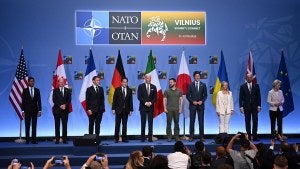Republicans with a very favorable view of the former president seem to prefer a US role that is more independent and less cooperative.
For the first time in the nearly 50-year history of the Chicago Council Survey, a majority of Republicans in 2023 said it would be best for the future of the United States to stay out of—rather than take an active part in—in world affairs. This reflects a major shift in public opinion since 2015, when GOP supporters were more likely than Democrats to favor an active role abroad. What's driving the drop in support? A closer look at the data reveals “Trump Republicans,” which make up 47 percent of Republican Party supporters, are much more negative than other “non-Trump Republicans” about the US global role in general, US alliances with Europe, and defending allies.1
Key Findings
- Forty percent of Trump Republicans think it would be best for the future of the country if the United States took an active part in world affairs, compared to 52 percent of non-Trump Republicans.
- Half of Trump Republicans (48%) say the United States should be the dominant world leader, while a majority of non-Trump Republicans (65%) say the country should play a shared leadership role.
- Four in 10 Trump Republicans perceive that US alliances with Europe either mutually benefit the United States and its European allies or that the United States alone benefits. By contrast, six in 10 non-Trump Republicans consider US-European alliances to have mutual or US-focused benefits.
- Half of Trump Republicans (53%) believe that US alliances in East Asia either mutually benefit the United States and its East Asian allies or that the United States alone benefits. Two-thirds of non-Trump Republicans (65%) consider US-East Asian alliances to have mutual or US-focused benefits.
- Just four in 10 Trump Republicans (41%) say that US alliances in the Middle East provide mutual benefits or benefits to the United States alone, down from 44 percent in 2017. Non-Trump Republicans are more appreciative of Mideast alliances, with 55 percent saying they are beneficial, similar to their views in 2017.
- Forty-one percent of Trump Republicans favor using US troops to defend Baltic allies, down from 56 percent in 2017. For their part, a majority of non-Trump Republicans (54%) would favor using US troops to defend the Baltic states, similar to their views in prior years.
GOP Support for US Global Engagement Falls, Especially among Trump Republicans
Support for active US participation in world affairs has declined considerably among both Trump and non-Trump Republicans. In prior surveys, majorities of both camps favored an active part in world affairs. But in 2023, only 40 percent of Trump Republicans say the United States should play an active part while 59 percent prefer to stay out of world affairs. Among non-Trump Republicans, a bare majority continue to support an active US role (52%), but 47% favor staying out.
Some of this decline among Republicans may be related to a shifting view of what constitutes an “active part” in world affairs for the United States. Since 2022, the Biden administration has focused on rallying US alliances to aid Ukraine in its fight against Russia, two focuses that fit poorly with the policy priorities of some Republicans given their disinclination to continue US involvement in the Ukraine war. Because of what Republicans see as an overemphasis on Ukraine at the expense of focusing on immigration and China, Republican support for a number of other policies related to the US military presence in Europe and defending US allies has dropped over the past few years.
While this is generally true for all Republicans, it is particularly the case among Trump Republicans. Nine in 10 (92%) say US leaders are not paying enough attention to the US-Mexico border, and two-thirds say leaders should pay more attention to US-China competition (64%) and Iran’s nuclear program (61%). At the same time, Trump Republicans see US leaders as paying far too much attention to climate change (72%) and the Ukraine-Russia conflict (60%)—two issues where non-Trump Republicans are somewhat more divided. Equal proportions of non-Trump Republicans say that US leaders are paying the right amount of attention to Ukraine (41%) as say they pay too much attention to the issue (40%). Similarly, while a plurality of non-Trump Republicans believe US leaders pay too much attention to climate change (45%), three in 10 say US leaders don’t pay the issue enough attention (30%); an additional 25 percent say they pay the right amount.
The decline in support for an active role in the world may also relate to Trump Republicans’ preferred type of US leadership role. Distinct from non-Trump Republicans, and other Americans as a whole, half of Trump Republicans (48%) say they want the United States to be the dominant world leader, rather than playing a shared leadership role (37%). By contrast, most Americans (66%)—and a majority of non-Trump Republicans (65%)—prefer the US to play a shared leadership role. That kind of shared leadership has been particularly emphasized by the Biden administration, and could be contributing to Trump Republicans’ rejection of an ‘active role’ for the United States.
Together, Trump Republicans’ view that US leaders are spending far too much time on the war in Ukraine and their preference for a dominant form of US leadership rather than a shared leadership role make them distinctly skeptical of the benefits of US alliances.
Trump Republicans Grow More Doubtful of Benefits from US-European Alliances
Only half of Republican Party supporters as a whole say that the United States alone or the United States and its European allies benefit from the transatlantic alliance, down from previous years when at least 54 percent thought there were benefits to both sides or at least the United States.
Trump Republicans have grown even more skeptical, with just 41 percent perceiving mutual or US-centered benefits, down from 49 percent when first asked in 2017. By contrast, a majority of non-Trump Republicans currently see mutual or US-focused benefits (59%), unchanged from 2017.
At the same time, however, Republicans from both wings of the party continue to favor the US commitment to NATO. Six in 10 Trump Republicans (61%) and three-quarters of non-Trump Republicans support increasing or maintaining the US commitment to the security alliance.
Majorities of Trump and Non-Trump Republicans See Benefits to US-East Asian Alliances
Republicans at large have grown more supportive of alliances with East Asian countries (59%, up from 51% in 2017), and this is true of both Trump and non-Trump Republicans. A slim majority of Trump Republicans (53%) believe that US alliances with Asian countries mostly benefit the United States or benefit the United States and these allies (up from 44% in 2017). And two-thirds of non-Trump Republicans feel the same way (65%), up slightly from 2017 when six in 10 viewed these alliances as benefiting the US or the US and its allies (59% combined).
Non-Trump More Likely than Trump Republicans to Sense Benefits from US Allies in Mideast
Overall Republican support for US alliances in the Middle East (48% in 2023) has dropped significantly from 2019 and 2020, returning to 2017 levels (when 50% sensed benefits to the US and its allies). Just four in 10 Trump Republicans (41%) sense mutual benefits or benefits to the United States alone, down from 44 percent in 2017. Non-Trump Republicans are more appreciative of Mideast alliances, with 55 percent saying they are beneficial, similar to their views in 2017.
Trump and Non-Trump Republicans Similar on Defending South Korea, but Differ on Defending Baltic NATO Allies
The 2023 Chicago Council Survey finds a decreasing percentage of Americans willing to send US troops to defend key allies if they were attacked, with much of the decline stemming from increased GOP opposition.
If Russia invades a NATO ally such as Latvia, Lithuania, or Estonia, fewer than half of Republicans (48%) say they would support using US troops to defend them, down from 54 percent in 2017. The decline in Republican support for defending NATO allies has been particularly sharp among Trump Republicans; today 41 percent of Trump Republicans favor using US troops to defend Baltic allies, down from 56 percent in 2017. For their part, a majority of non-Trump Republicans (54%) would favor using US troops to defend the Baltic states, similar to their views in prior years.
That decline also extends to the case of defending South Korea from a North Korean invasion. Today just 46 percent of Republicans favor sending US troops to defend Seoul—far below the 70 percent who supported this in 2017.
Trump Republicans and non-Trump Republicans are not radically different on this question (55% of Trump Republicans and 51% of non-Trump Republicans would oppose this deployment to South Korea), though non-Trump Republicans are more closely divided. By comparison, in 2017, a solid majority of Trump Republicans supported using US troops to defend South Korea (73%), as did two-thirds of non-Trump Republicans (65%).
Trump Republicans More Likely than Non-Trump Republicans to Favor Defending Taiwan
There is one case in which Trump Republicans are more likely than other Republicans to support the involvement of US forces in an international conflict. Should China invade Taiwan, nearly half of Trump Republicans (47%) favor sending US troops to the island, compared to roughly four in 10 among all other partisan groups. Trump Republicans are also more likely than other Republicans to favor using the US Navy to break a Chinese blockade of the island (56%, vs. 48% of non-Trump Republicans)—though Trump Republicans are less likely to support providing Taiwan with additional arms and military supplies.
This greater willingness to involve the US in a conflict with China over Taiwan reflects Trump Republicans’ disproportionately greater concern about China as a threat: eight in 10 (79%) view China’s development as a world power as a critical threat to the United States, compared to 58 percent of Americans overall and two-thirds (65%) of non-Trump Republicans. This is also a somewhat novel concern: in 2018, only half of Trump Republicans (48%) and a third of non-Trump Republicans (35%) viewed China’s rise as a threat to the US.
Conclusion
While these data point out some differences between “MAGA” Republicans versus others, the overall picture is one that points to a diminishing appetite among the GOP electorate to continue US international engagement at the current level and in its current forms. It’s likely that a large portion of this sentiment is linked specifically to the ongoing war in Ukraine, which Trump Republicans in particular would generally prefer to see the United States less involved and invested in. Rather than the Biden administration’s heavily alliance-focused approach to US foreign policy, Trump Republicans seem to prefer a US role that is more independent, less cooperative, and more inclined to use military force to deal with the threats they see as the most pressing, such as China, Iran, and migration across the US-Mexico border.
- 1
Among the overall US public, 27% self-identify as Republican Party supporters. For the purposes of this analysis, “Trump Republicans” refer to those Republican Party supporters who express a very favorable opinion of Donald Trump (47% of overall Republicans, 13% of the general public). Non-Trump Republicans are those who express only a somewhat favorable or unfavorable view of the former president (53% of overall Republicans, 14% of the general public). See the Methodology section for more details.
This analysis is based on data from the 2023 Chicago Council Survey of the American public on foreign policy, a project of the Lester Crown Center on US Foreign Policy. The 2023 Chicago Council Survey was conducted September 7–18, 2023, by Ipsos using its large-scale nationwide online research panel, KnowledgePanel, in both English and Spanish among a weighted national sample of 3,242 adults 18 or older living in all 50 US states and the District of Columbia. The margin of sampling error for the full sample is ±1.7 percentage points. The margin of error is higher for partisan subgroups or for partial-sample items.
Partisan identification is based on how respondents answered a standard partisan self-identification question: “Generally speaking, do you think of yourself as a Republican, a Democrat, an Independent, or what?”
The 2023 Chicago Council Survey is made possible by the generous support of the Crown family, the Korea Foundation, and the United States-Japan Foundation.
Among the overall US public, 27 percent self-identify as Republican Party supporters. For the purposes of this analysis, “Trump Republicans” refers to those Republican Party supporters who express a very favorable opinion of Donald Trump (47% of overall Republicans, 13% of the public overall). Non-Trump Republicans are those who express only a somewhat favorable or unfavorable view of the former president (53% of overall Republicans, 14% of the public overall). The proportion of Republicans who hold a very favorable view of him has varied over time, with generally just over half of self-identified Republicans holding a very favorable view of Trump (see below figure).
Demographically, Trump and non-Trump Republicans look similar aside from education. Trump Republicans are notably more likely to have a high school education or less, while non-Trump Republicans are more likely to have a bachelor’s degree (or a more advanced degree).




Related Content
 US Foreign Policy
US Foreign Policy
Republicans with very favorable views of Trump are more likely than other GOP backers to support deportations for undocumented immigrants.
 US Foreign Policy
US Foreign Policy
Republicans with a somewhat favorable or unfavorable view of the former president are more likely to say US assistance to Kyiv has been worth the cost.
 US Foreign Policy
US Foreign Policy
For the first time, a majority of Republicans think the United States should stay out of world affairs.
 Public Opinion
Public Opinion
As the war in Ukraine continues, majorities say the United States should maintain or increase its commitment to NATO.


